Startup Bootcamp for Lawyers
(Updated 5-6-17). As if CodeX FutureLaw 2017 was enough to explode your brain, the CodeX leaders decided to offer “before” and “after” events that drew in even more enchanted attendees. On April 5, Daniel Martin Katz and Michael Bommarito held a fascinating presentation, “Measuring the Temperature and Diversity of the U.S. Regulatory Ecosystem.”
The after-FutureLaw event was the inaugural “Startup Bootcamp for Lawyers,” held April 8 & 9 (Saturday and Sunday) from 9 a.m. to 5 p.m.
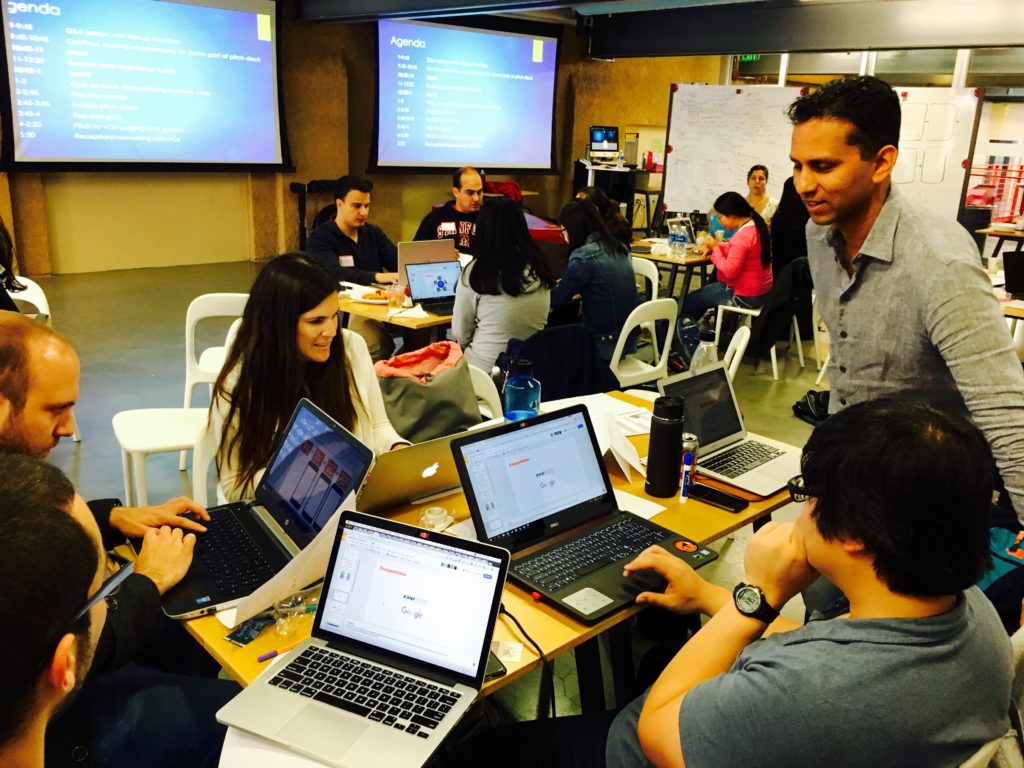
THE VISION
The idea for the bootcamp: “Hands-on crash course on product, design and pitching to give law students an insider’s view on building a startup,” explained Jay Mandal, Vice President of Product Strategy at SAP and a CodeX Fellow (he previously served as CEO of a Google Ventures-funded startup and Apple’s head M&A lawyer).
Teaching the event were Mandal and Jose Fernando Torres Varela, a Fellow at the Stanford Center for the Legal Profession’s Legal Design Lab and Director of the Innovation Law Center at the University Sergio Arboleda in Colombia (and formerly an Skadden Arps attorney). Susan Salkind, CodeX’s Residential Fellow, was also a key member of the organizing team.
THE CONCEPT
The free bootcamp was limited to 25 Stanford Law School students. It was designed as a “hands-on workshop to experience the startup journey—by learning and applying the design and product skills necessary to build a startup,” said Mandal. “The goal is to help the students become more entrepreneurially-minded practitioners within law firms, as in-house company counsel, or even as future startup founders.”
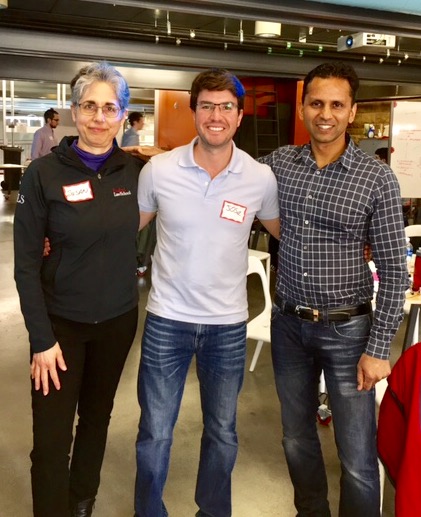
The agenda: a design sprint! The students had to develop a product, build a business case and pitch deck, and then pitch to venture capitalists. Sponsors: CodeX: The Stanford Center For Legal Informatics and the Stanford Center on the Legal Profession.
Mandal and Torres expected a handful of applicants, but were delighted to find that more than 100 people had applied, some not from the law school. They whittled the requests down to 25 attendees.
The bootcamp actually started on Wednesday, April 5, from 8:30 a.m.-10:00 a.m. in the Stanford Law Library Building. where the attendees got homework: They had to create a press release, based on Amazon’s rules, and they were asked to read The Art of the Start 2.0, by Guy Kawasaki and books by Steve Blank and Ben Horowitz, as well as articles on pretotyping.
Then it was time to move to Stanford’s famous “d.school” facility for the weekend adventure. Several mentors joined the group, included Margaret Hagan (d.School Lecturer, Director Stanford Legal Design Lab; Toni Lai (CodeX Fellow, Legal.io co-founder), Pablo Arredondo (Casetext co-founder); and moi. Assisting with Twitter posts was CodeX Fellow Hilary Ferejohn.
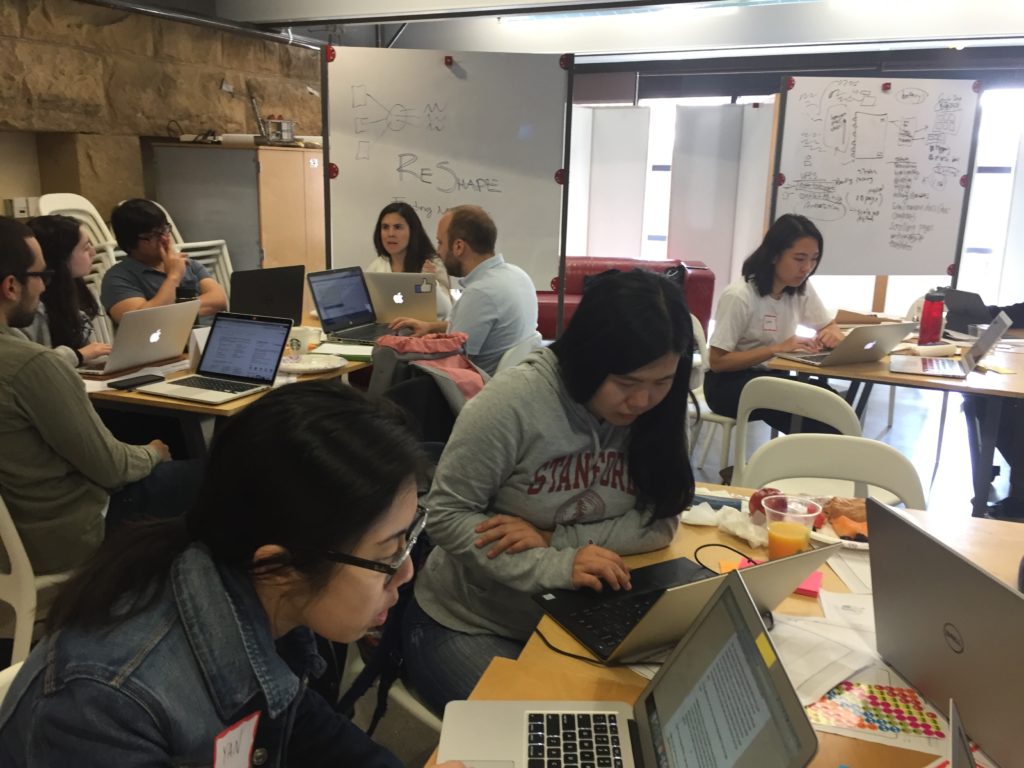
THE COMPANIES
The five teams chose their topics. Below is the list of teams, and their initial “business case.”
Note: My role was to advise teams about how to present their companies to journalists, potential buyers and funders. A very common mistake in presentations and press releases is using tech jargon, which creates walls, not bridges. If the audience doesn’t understand the presentations or press release, they immediately turn off. I urged the teams to avoid using the two most overused words: solution and revolutionary. So to practice what I preach, I edited those two words via [ ] on the business cases.
#1 Wearables/Fitness
Business case: Working age consumers (ages 21 and up)—both unhealthy and healthy—are in need of [options] to monitor and get actionable feedback on their health and dietary habits on a daily basis. Team: Winnie Liang, Benjamin Gloger, Damira Khatam, Clarisse Medeiros de la Cerda.
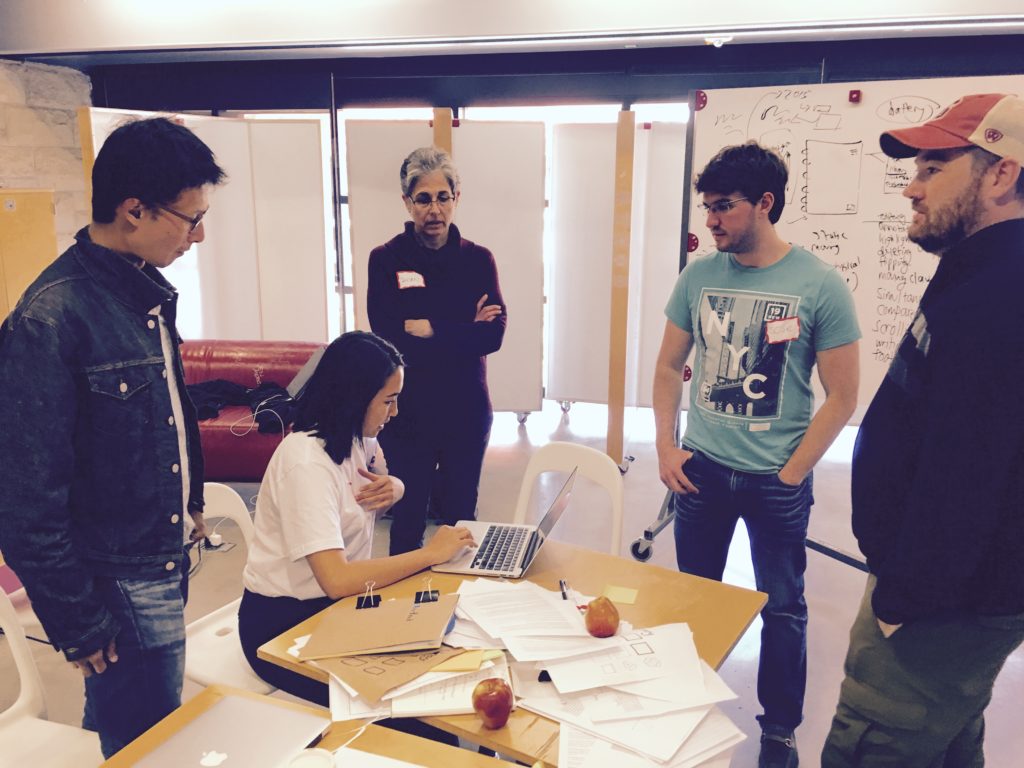
#2 IoT (Internet of Things)
Business case: For those consumers conscious of conserving resources (e.g., for ecological, cost-saving reasons, or other reasons), what [offerings] could you create that incorporates IoT technology? Team: Alex Toh, Donna Ni, and Jason Moyse (Stanford CodeX Fellow who worked with and mentored the group).
#3 Legal Technology
Business case: Consumers are in need of a [tool] that provides truly real-time legal advice to help them in times of crisis (i.e., car accidents, misdemeanor crimes, harassment, landlord-tenant issues). Team: Elizabeth Wu, Yanyun Lin, Bruno Silveira, Yan Yan, Frank Pensabene.
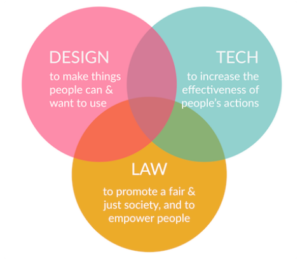
#4 Augmented Reality / Virtual Reality / Haptics
Business case: Create a specific visual and sensory experience for users using A/R or V/R technology that addresses a certain customer segments’ needs. Team: Michael Abramson, Gang Cheng, Mingzhu Long, Jacob Finkel.
#5 Public Sector / Education / Workforce
Business case: Create a product that identifies/reaches out to a working population vulnerable to job loss as a result of future disruptive/autmation technologies (e.g. macchine learning, robotics) and/or provides a [remedy] to this problem for this affected population. Team: Rachel Boochever, Yindee Limpives, Maria J Cordero; Shane Seppinni, Fernando Quezada.
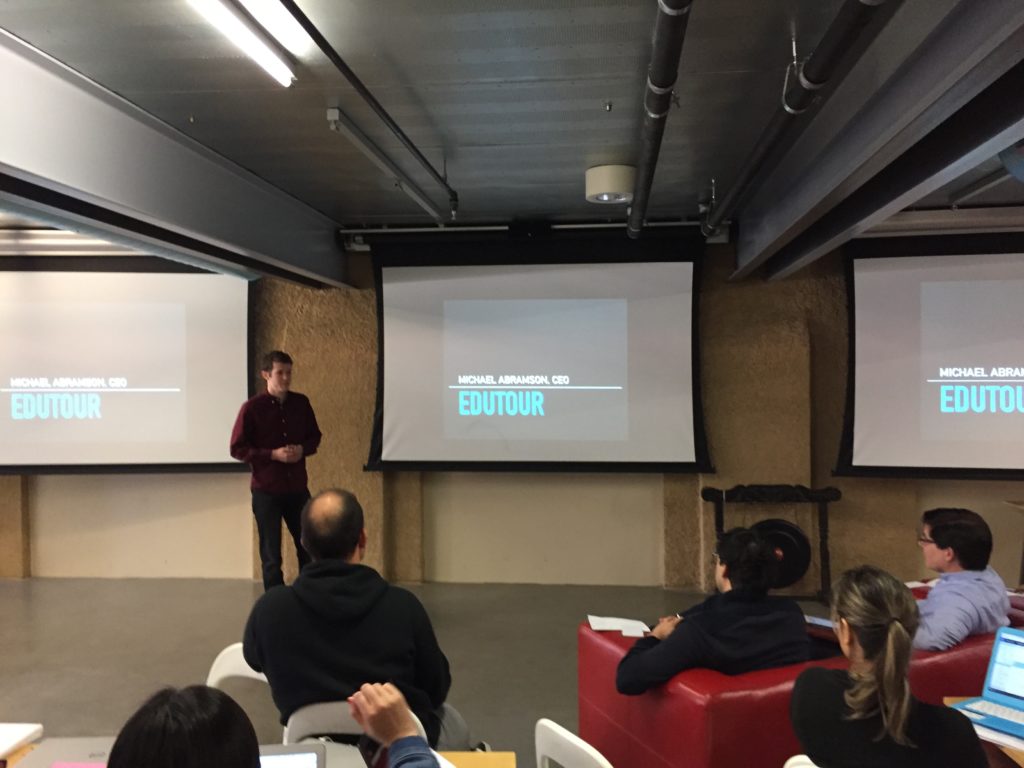
THE PROCESS
The two-day schedule was intense, to put it mildly. On Saturday, the students got crash courses on “Principles/Rules of Engagement and Expectations” (Mandal and Torres) and then Market Opportunities for Startup Fundamentals (Mandal), followed by Prototyping (Torres). Then more work on the the startups. In the afternoon, the teams were tasked to work in refining the startups and creating pitch decks.
Over the two days, the teams would be intentionally interrupted with tasks. In one case, they would have to “pitch” their startup to another team. The mentors would be called upon to look at the products in process and provide feedback. For example, I suggested that team #3 (Legal Technology) change it’s product name because it was too vague. The team quickly came up with a much better moniker to CrashHelp, that better identified the tool than its previous InstantLegal.
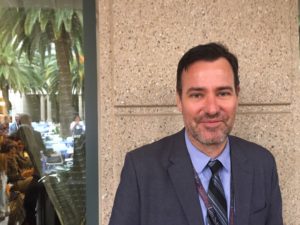
On Sunday morning, the teams got a break from coding for a terrific panel with as Roland Vogl (Executive Director of CodeX; Executive Director of the Stanford Program in Law, Science and Technology; and a Lecturer in Law) and Nitin Gupta (co-founder of LawPivot [acquired by Rocket Lawyer]—and Fairy).
Gupta complimented Mandal and the team, for “an amazing job putting this talented group of entrepreneurs and lawyers under one roof. Their passion and enthusiasm were contagious—and I had a blast sharing my experience as an entrepreneur. The informative sessions are the exact framework you need to become a successful entrepreneur. I am looking forward to attending next year and seeing how each talent individual progresses.”
After lunch, the teams each had a warm-up” mock presentation,” with feedback from Mandal, Torres and moi. Then it was time for the final presentations!
THE WINNERS
The VC judges were Saad Khan, founder / VC at Uprising Ventures; Emily Chiu, partner at 500 Startups; and F. Daniel Siciliano, Professor of the Practice of Law, and Associate Dean. Here are there conclusions:
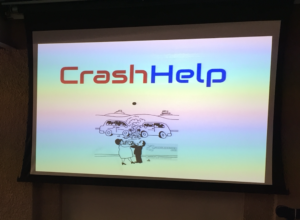
Best Company: Crashhelp (née: Business Case #3-Legal Technology). A mobile-based instant insurance and settlement offering that helps drivers whom get into an accident immediately know their options and get fast resolution.
Best Pitch: Edutours (née Business Case #4—Augmented Reality / Virtual Reality / Haptics). A virtual reality campus tour for use by educational institutions looking to attract students and to help college applicants explore the college experience through virtual technology.
Best Prototype: Everbook (née Business Case #2—IoT (Internet of Things). An e-book designed with the tactile feel of a real book that can store and display all of a lawyer’s documents, and with broader application to other professionals.
Said Chui: “Jay Mandal and the team at Stanford put together a fantastic event; Startup Bootcamp for Lawyers is a unique way for law students to gain first-hand experience on what it’s like to take a startup idea from prototype through pitch in front of venture capitalists and investors. As a judge, I was impressed by the students I met and what they were able to showcase after this weekend program.
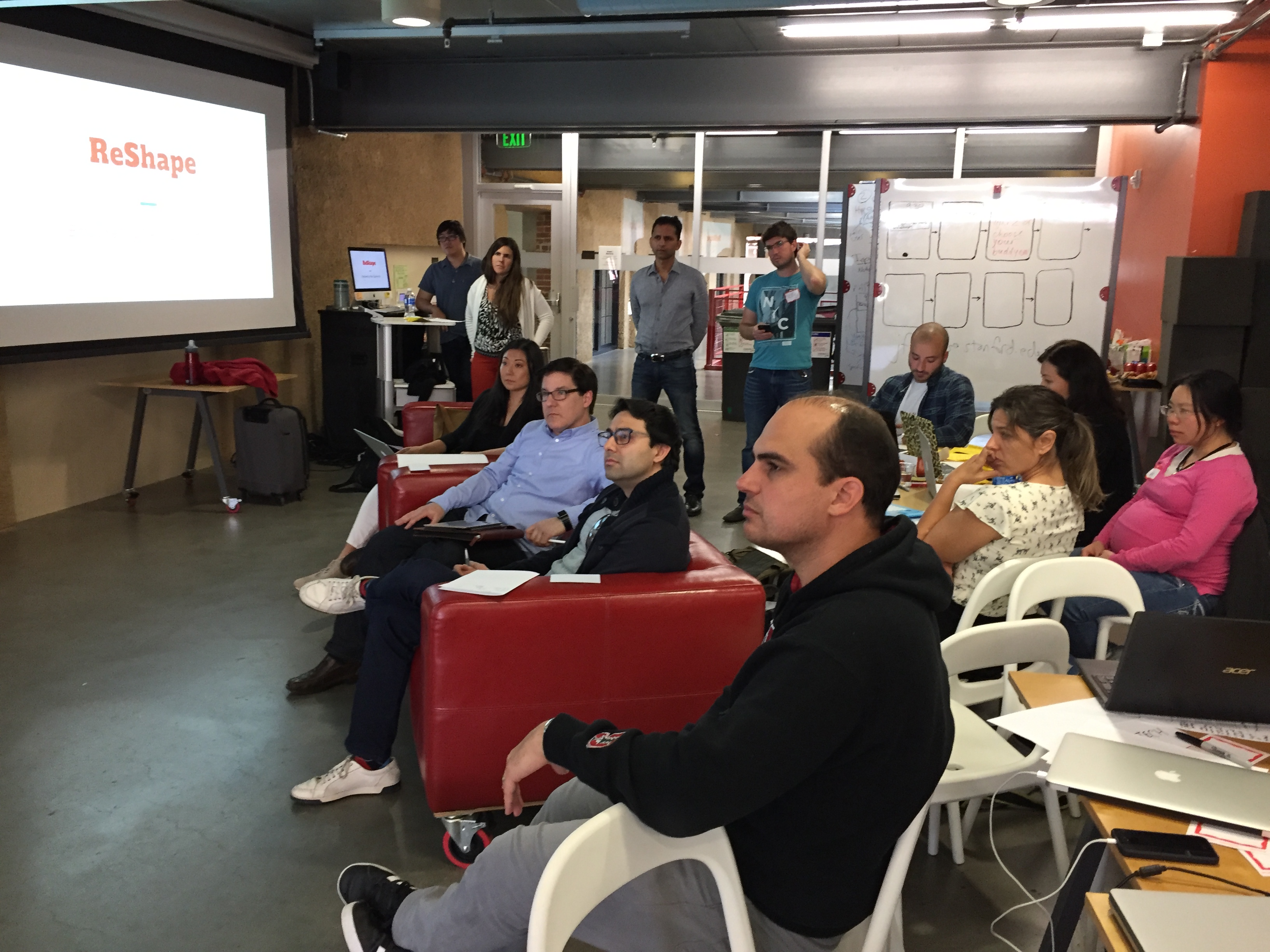
Observed Torres: “We organized the bootcamp to give students a taste of what it’s like to create a startup. It was great to see the students out of their comfort zone, creating prototypes and using design thinking methods. The work done by the students was fantastic and we were completely blown away by the quality of the prototypes and pitches made.”
“Given the changes that the legal profession is going through, equipping students with entrepreneurial skills will invaluable to help them adapt and thrive in times of change,” he said.
Asked what might be next: “After this first Startup Bootcamp for Lawyers, we are exploring the possibility of running a different version where students use startup-skills to solve public sector and social issues.”
PERSEVERANCE & PARITY
At the beginning of the bootcamp, there were 25 attendees—21 participants (counting Jason Moyse) made it to the finish line. And there was also another important metric: there was 50/50 parity in women and men attendees. And among the mentors, organizers and panelists, there were five women. That is expecially critical because of the frustrating problem in Silicon Valley where only 20% of women work in tech shops, and the gender pay differentials for women across law firms (17%) and 18% in Big Law.
SIX QUESTIONS FOR STUDENTS
(Trimmed slightly.)
1. What was the biggest surprise about the bootcamp?
Donna H Ni: “I was surprised by how quickly the team took ownership over the project. We received the assignment on Wednesday, by Saturday everyone was very invested in developing the product and thinking about how to improve it. By Sunday our prototype felt like a child we were raising. I can see how entrepreneurship can become addicting. It’s an exhilarating and creative process.”
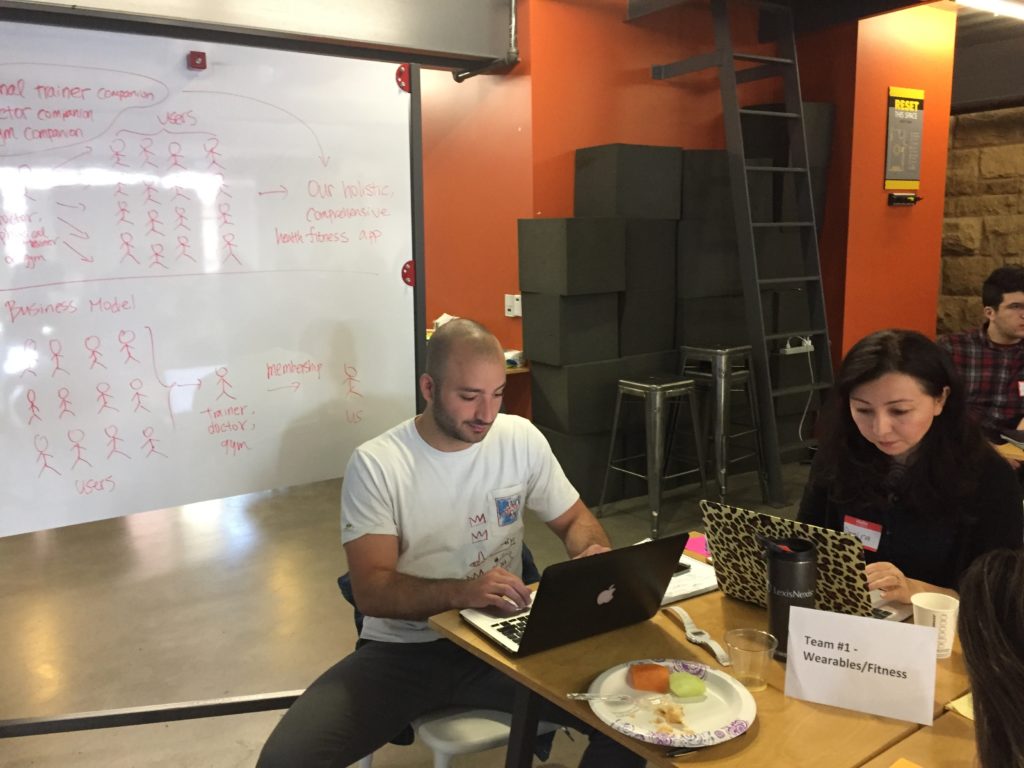
Fernando Quezada Trevino: “When I registered I never imagined the work product would look as good as it did. We were all very impressed and so were the VCs. It was particularly fun to see the huge improvement from all projects during the last hours.”
Winnie Liang: Coming from a science background, I was taught to do things in a systematic and rigorous fashion, e.g. with numbers and physical proofs. I was surprised when we were asked to prototype a typical user’s experience interacting with some new technology. Nonetheless, it turned out to be a great learning, hands-on experience, because I had no prior knowledge about software startups. Now, thanks to this amazing bootcamp, I am seriously thinking of collaborating with other Stanford students to start the next great company!
Elizabeth Wu: “How fun the whole process could be, and how far the idea was developed in the time. Also how many creative ideas the teams came up with.”
Rachel Boochever: “How much my team’s idea iterated and changed throughout the process. We were still tweaking our idea right up until the final pitch.”
2. What was your biggest challenge?
Ben Gloger: “Extending my analysis of problems users might have beyond that of the law/areas that I know a lot about. Similarly, it was hard to use a user centric design process when the user in mind was not someone like me.”
Wu: “Time management was a bit tricky.”
Ni: “An initial challenge for our team was in the brainstorming stage. Law students are trained to nitpick ideas and to quickly think of pros and cons. But for our team to come up with creative/10x ideas, we needed to turn off our critical tendencies and just let each other express our wildest ideas without inhibition.”
Trevino: Initially I thought the biggest challenge would be related to the fact that we will be with people from four different cultures and backgrounds. In the end, the biggest challenge was trying to work with an all-lawyer group outside of our comfort zone in a business design environment.
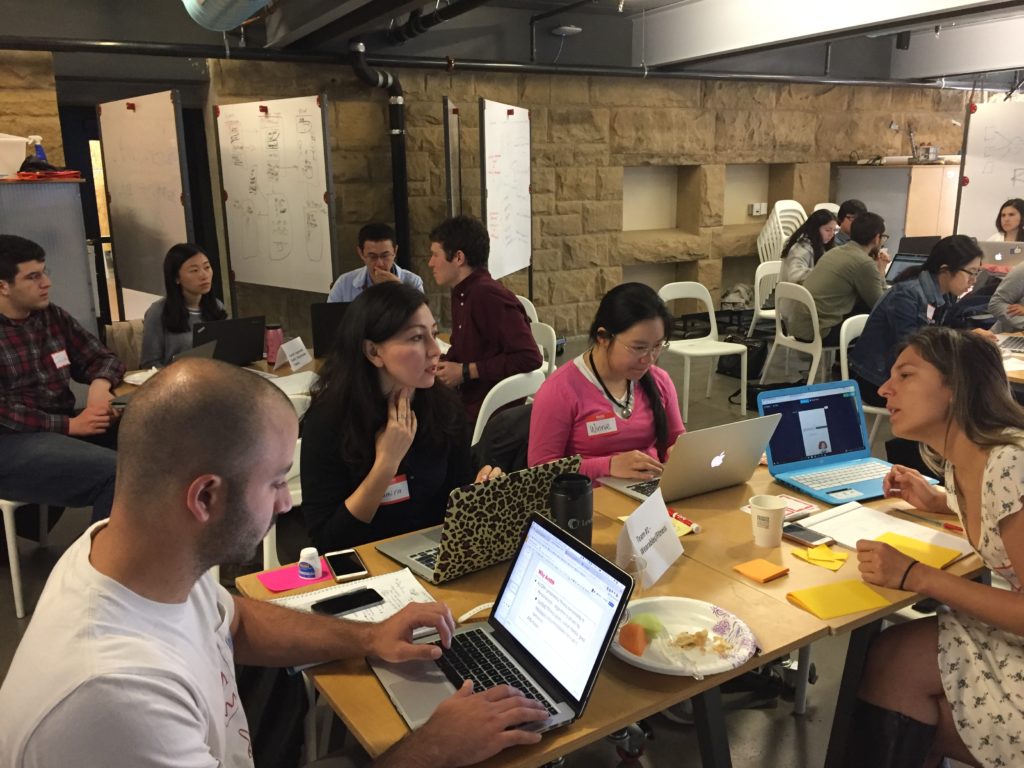
3: What was easier than you expected?
Trevino: The final pitch to VCs. After the long hours of intense work, you know your product inside and out, you have already gone through all alternative ideas you decided to discard and you know exactly why your product is the best investment. It’s just about a comprehensive short explanation of all you know.
Boochever: It was easier than I expected to work with my team. Everyone came in incredibly energized and ready to work, and that contributed to a really amazing experience.
Gloger: The teamwork aspects of the project. Everyone got along really well, and it was really easy and productive to collaborate as a group.
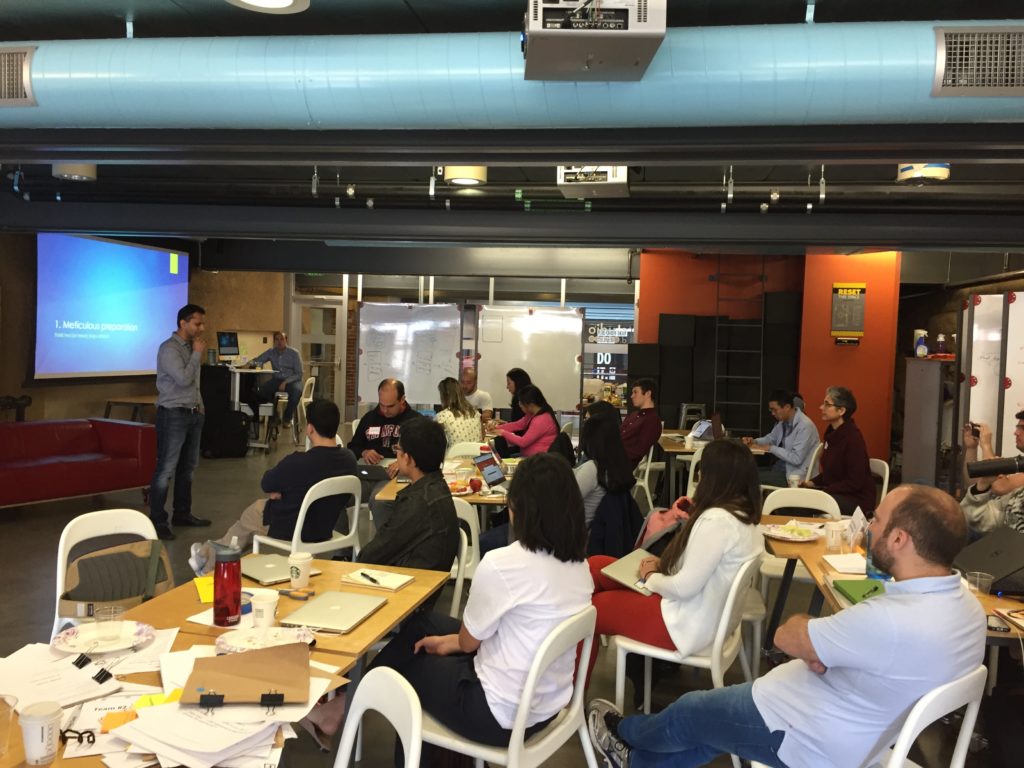
4. What takeaway was the most helpful from the teachers?
Ni: “The most helpful takeaway from the teachers was that you can apply the principles of entrepreneurship to your own life.
Trevino: “The importance to take full advantage of being a Stanford student to pursue your dreams. It’s a rare opportunity that goes by fast.”
Wu: “Tips about pitching.”
Gloger: “That the best part of negotiating or designing a product is to truly listen to the other side to better understand their needs, pains, or wants. Working collaboratively towards solving them is then the best way of negotiating/designing a product.”
5. What takeaway from the VCs was most helpful?
Trevino: “Test your key business hypothesis early and as cheaply as you can. Avoid taking money from VCs for as long as you can.”
Wu: “Tips about what they are looking for.”
Boochever: If you’re going to start your own company, make sure it’s something you’re truly passionate about. It takes a lot of hard work, and you might face a lot of rejection, so you need to really believe in your idea.
6. Where do you plan/hope to be in 5 years?
Trevino: “I plan to be back home in Mexico leading law innovation in the country through my legal practice.”
Wu: “I’m not sure! But now I’m definitely more open to doing something entrepreneurial or working with entrepreneurs.”
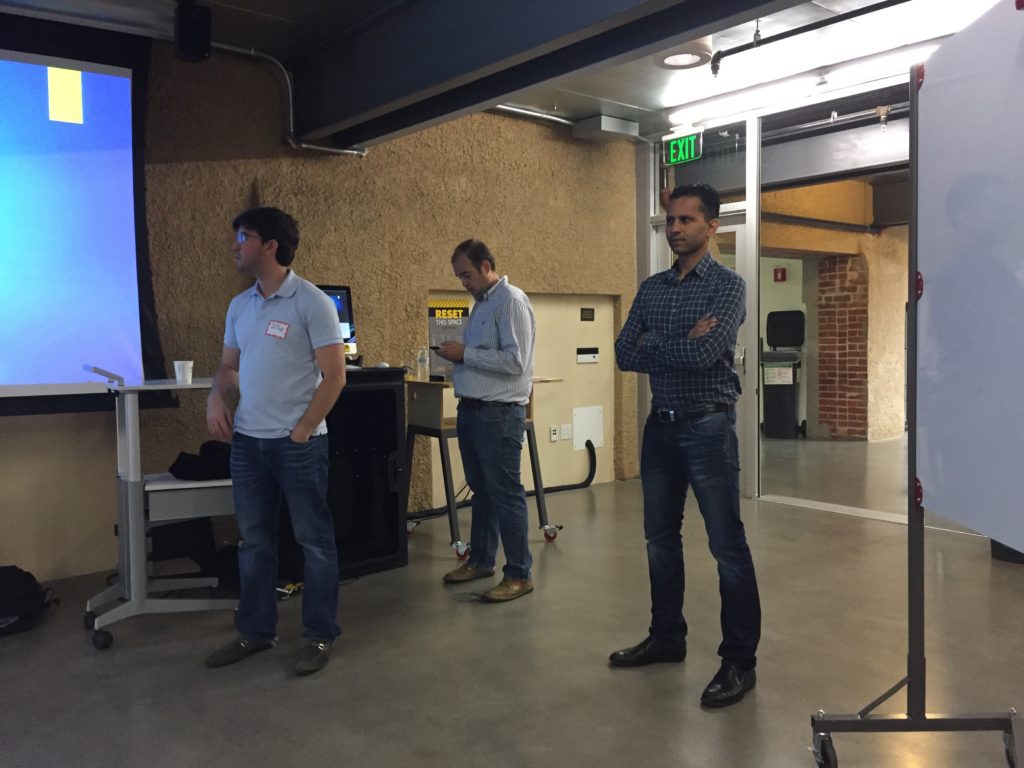
FOUR QUESTIONS FOR JAY MANDAL
1. What was most satisfying? To see the law students roll up their sleeves to design prototypes and refine their products. They were flexing their intellectual muscles in ways they never expected as law students. Every lawyer doesn’t need to pursue the startup path, but exposure to the disciplines required to be a startup founder (product, design, etc.) are valuable for being successful in their future careers. This type of cross-disciplinary training will help prepare them to be more entrepreneurial and flexible—to adapt to future changes—resulting from new technologies or processes that will impact our profession.
2. What surprised you? The passion and seriousness with which the law students took each of their product and design assignments. They may never have done this before, but the students were hell bent on delivering a great final product.
3. What was your favorite moment? When all of the law students, after their countless hours of hard work, presented their business pitches and prototypes to the panel of venture capitalists. I think many were surprised by what they could produce in just a couple of days, with no prior exposure to this area.
4. What will you do next? We aim to refine this class and open it up to more students. It meets a unmet demand—many law students want to learn what it takes to run a startup, either to start their own or work with them in their future careers. As organizers, we were also deeply humbled that our goal to teach a dozen or so students to start thinking like (and maybe becoming) startup entrepreneurs turned into this Stanford class of 25 driven students prototyping, pitching, negotiating and competing to be the best idea. We were so proud of the students when Saad Khan, one of our VC panelists, said their final pitches were “like startups that had been building your companies for a while” and not just over the weekend. Again, this is thanks to our collective effort to bring a more entrepreneurial spirit to the law school.
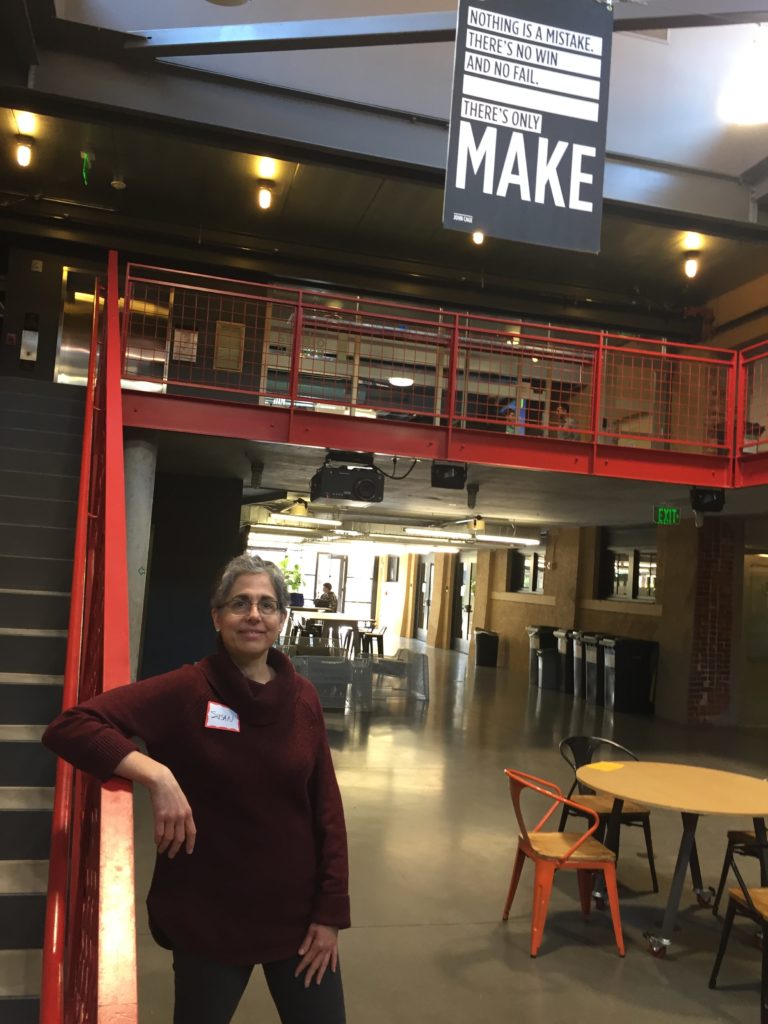
ONWARD
Susan Salkind summed up the experience: “It was great fun working with such a highly engaged group of students, and to see the evolution within each team from concept to polished pitch by the end of the weekend. Tons of energy and entrepreneurial spirit in the room!
Monica Bay is a Fellow at CodeX and a freelance journalist and analyt. She is a member of the California bar. Email: mbay@codex.stanford.com. Twitter: @MonicaBay.
Post Pagination
